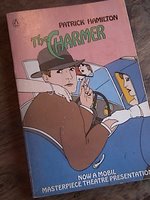The eponymous Gorse is a grifter, a player, a user, with a decided nasty streak. He's indifferent to his victims, but also pretty passionless about his gains from them. He has one eye always on the prize, but his focus is on perfecting his technique, his game.
Gorse, when lounging at one end of an expensive bar nearly always wore a monocle and looked like a curious, undistinguished mixture between Bertie Wooster and Satan.
An astute observer would have been more impressed by the moustached-satanic, rather than the monocled-Wooster, aspect of the young man, and would have realized that he was looking at a character by no means unformidable.
Mr Stimpson was not an astute observer, and at the moment even less so than usual, because of his uneasiness at his first entrance into the well-known, well-lit, glittering, thickly-carpeted bar. The fact that Gorse was there, indeed, made the young man seem quite angelic — certainly not satanic.
Nor did Mr Stimpson observe, in the first few minutes of talking to Gorse, that he had been tempted by Satan, in the person of Gorse, and had succumbed. He had, however.
For Gorse had ordered for Mr Stimpson an extremely strong cocktail. This was on the bar beside his own drink, and both had a most pleasant, green, frothy appearance. But Gorse's drink, though it resembled Mr Stimpson's externally, had practically no alcohol in it. He was, therefore, deceiving as well as tempting Mr Stimpson.
"I've taken the liberty of ordering a drink for you," he said. "In my view it's the very best they provide here — but if you don't like it, I'll order something else, and drink it myself . . . I often think it's a pity they don't like you drinking good old beer in places like this — don't you?"
Mr Stimpson did not like cocktails, but, by these last words of Gorse, was of course shamed into readily accepting what Gorse had provided for him. The Tempter tempts with shame very often.
The prize here from Mr Stimpson is information and, in a few hours, a compromising situation that Gorse can later use against him.
 The Charmer was originally titled Mr Stimpson and Mr Gorse. Indeed, the main character could be said to be Mrs Plumleigh-Bruce, who, really, has to choose between the two. Both men are trying to play her, to different ends, but while Stimpson is necessary to move the plot forward, his character is never under study to the degree it is with Gorse and the widow — he's the facilitator to them both.
The Charmer was originally titled Mr Stimpson and Mr Gorse. Indeed, the main character could be said to be Mrs Plumleigh-Bruce, who, really, has to choose between the two. Both men are trying to play her, to different ends, but while Stimpson is necessary to move the plot forward, his character is never under study to the degree it is with Gorse and the widow — he's the facilitator to them both.Stimpson has his crossword puzzles. A drinking buddy, Major Parry, has an Armistice Day Poem to compose. Our lady Joan keeps a diary. All these obsessions are extensions of their egos, and Hamilton invites us into their banal machinations. These are some of the funniest bits of the book (and this book is pretty funny), but also, after a while, the most tiresome (especially the diary entries); however, they serve the purpose of demonstrating how petty — and stupid — these people can be.
I'm now reading about Ernest Ralph Gorse's early years in The West Pier, a recent serendipitous find, said by Graham Greene to be "the best novel written about Brighton." The West Pier is the first of the Gorse trilogy. The Author's Note in my copy states that "There may be some readers who, on learning this, will feel that The West Pier is not a complete story in itself. The author is anxious to assure any such reader that it actually is." Mr Stimpson and Mr Gorse, I've only just confirmed, is the second, and I assure you that it can stand alone. I'm reading them in reverse order because that's the order in which I acquired them.
The Charmer's cover copy calls it a "spine-tingling tale of seduction and murder." I did not read about any murder. I suspect this must refer to the Masterpiece Theater dramatization (1987), which either took liberties (certainly the character in the cover illustration is not moustached) or stretched to encompass bits from the volumes on either side of it. Early in The Charmer it's noted that "Miles Standish was, in fact, one of the select few first to suspect that Gorse was up to no good in life generally — that he was, possibly, destined to see the inside of prison bars." The book ends with Gorse driving off in his ravishingly new Sunbeam. We're told he is to die painlessly and quickly; it's hinted that this will occur in a car. Reading this, I couldn't tell if this was meant to conclude the trilogy, or if details would be fleshed out in a subsequent volume. But I'm now on the lookout for a copy of Unknown Assailant, hoping for murder, prison, and a fatal automotive incident.


No comments:
Post a Comment